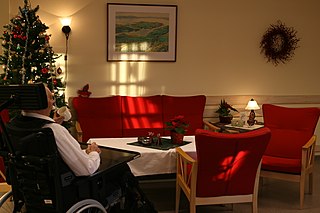Service and supports for people with disabilities are those government or other institutional services and supports specifically provided to enable people who have disabilities to participate in society and community life. Some such services and supports are mandated or required by law, some are assisted by technologies that have made it easier to provide the service or support and others are commercially available not only to persons with disabilities, but to everyone who might make use of them.
Developmental disability is a diverse group of chronic conditions that are due to mental or physical impairments that arise before adulthood. Developmental disabilities cause individuals living with them many difficulties in certain areas of life, especially in "language, mobility, learning, self-help, and independent living". Developmental disabilities can be detected early on and persist throughout an individual's lifespan. Developmental disability that affects all areas of a child's development is sometimes referred to as global developmental delay.

Long-term care (LTC) is a variety of services which help meet both the medical and non-medical needs of people with a chronic illness or disability who cannot care for themselves for long periods. Long term care is focused on individualized and coordinated services that promote independence, maximize patients' quality of life, and meet patients' needs over a period of time.
The Lanterman Developmental Disabilities Act, also known as the Lanterman Act, is a California law, initially proposed by Assembly member Frank D. Lanterman in 1973 and passed in 1977, that gives people with developmental disabilities the right to services and supports that enable them to live a more independent and normal life. The legislation significantly expanded upon its landmark predecessor, the Lanterman Mental Retardation Services Act, initially proposed in 1969. The original act extended the state's existing regional center network of services for the developmentally disabled, while mandating provision of services and supports that meet both the needs and the choices of each individual.
A group home is a private residence model of medical care for those with complex health needs. Traditionally, the model has been used for children or young people who cannot live with their families, people with chronic disabilities who may be adults or seniors, or people with dementia and related aged illnesses. Typically, there are no more than six residents, and there is at least one trained caregiver there 24 hours a day. In some early "model programs", a house manager, night manager, weekend activity coordinator, and 4 part-time skill teachers were reported. Originally, the term group home referred to homes of 8 to 16 individuals, which was a state-mandated size during deinstitutionalization. Residential nursing facilities, also included in this article, may be as large in 2015 as 100 individuals, which is no longer the case in field such as intellectual and developmental disabilities. Depending on the severity of the condition requiring one to need to live in a group home, some clients are able to attend day programs and most clients are able to live normal lifestyles.
Ageing, Disability and Home Care NSW (ADHC) is a division of the Department of Family and Community Services in the Government of New South Wales that is responsible for the provision of services to older people, people with a disability, and their families and carers in the state of New South Wales, Australia.
The Arc of Frederick County is an advocacy agency supporting adults and children with developmental disabilities to lead enviable lives in the community. The Arc was founded in Frederick, Maryland by parents in 1958 in response to the lack of community programs for children and adults with developmental disabilities. The Arc continues its advocacy efforts and the creation of new services for individuals and families today.
Florida has several Medicaid Waiver Programs. Medicaid Waiver Programs allow recipients to 'waive' institutionalization and instead choose to direct services to assist them to live in the community. Waiver program services may offer additional supports and services than provided by traditional Medicaid.
Supported employment refers to service provisions wherein people with disabilities, including intellectual disabilities, mental health, and traumatic brain injury, among others, are assisted with obtaining and maintaining employment. Supported employment is considered to be one form of employment in which wages are expected, together with benefits from an employer in a competitive workplace, though some versions refer to disability agency paid employment. Companies such as Skilcraft in the United States are an example of supported employment.

Intellectual disability (ID), also known as general learning disability and mental retardation (MR), is a generalized neurodevelopmental disorder characterized by significantly impaired intellectual and adaptive functioning. It is defined by an IQ under 70 in addition to deficits in two or more adaptive behaviors that affect everyday, general living.

Paul Wehman is a Professor of Physical Medicine and Rehabilitation at Virginia Commonwealth University, and an early pioneer of supported employment. Wehman's primary interests are in transition from school to work, supported employment, business partnerships, and return to work. Wehman is Chairman for the Division on Rehabilitation Research at Virginia Commonwealth University's School of Medicine, with joint appointments in the Departments of Special Education and Disability Policy and Rehabilitation Counseling. He is the Chief Research Officer for the VCU Center for Rehabilitation Science and Engineering, an interdisciplinary research unit furthering the science and serving the needs of persons with disabilities. He has written, co-authored, or edited 43 commercially published books and written over 200 journal articles, mostly in the transition and employment areas. He is on several editorial boards and has been Editor of the Journal of Vocational Rehabilitation since 1991 to present.

The University Neuropsychiatric Institute (UNI), located in University of Utah Research Park in Salt Lake City, is a 120-bed mental health and substance abuse treatment institute for psychiatric treatment. They provide inpatient, day treatment, intensive outpatient and outpatient services for children, adolescents and adults.
The Human Resources Administration or Department of Social Services (HRA/DSS) is the department of the government of New York City in charge of the majority of the city's social services programs. HRA helps New Yorkers in need through a variety of services that promote employment and personal responsibility while providing temporary assistance and work supports. Its regulations are compiled in title 68 of the New York City Rules. The current Commissioner of HRA is Stephen Banks, who was appointed to the position in April, 2014 by Mayor Bill de Blasio. HRA is the largest city social services agency in the United States. It has a budget of $9.7 billion, employs over 14,000 people, and serves over 3 million New Yorkers.
Intermediate Care Facilities for Individuals with Developmental Disabilities (ICF/MR) is a disability benefit that is offered through United States Medicaid funding. Section 1905(d) of the Social Security Act enacted benefits and made funding available for "institutions" for individuals with mental retardation or developmental disabilities (MR/DD), the Act states these facilities providing for the MR/DD population must provide adequate "active treatment," currently defined by Secretary of the U.S. Department of Health and Human Services.
Community integration, while diversely defined, is a term encompassing the full participation of all people in community life. It has specifically referred to the integration of people with disabilities into US society from the local to the national level and for decades was a defining agenda in countries such as Great Britain.
Family support is the support of families with a member with a disability, which may include a child, an adult or even the parent in the family. In the United States, family support includes "unpaid" or "informal" support by neighbors, families and friends, "paid services" through specialist agencies providing an array of services termed "family support services", school or parent services for special needs such as respite care, specialized child care or peer companions, or cash subsidies, tax deductions or other financial subsidies. Family support has been extended to different population groups in the US and worldwide. Family support services is currently a "community services and funding" stream in New York and the US which has had variable "application" based on disability group, administrating agency, and even, regulatory and legislative intent.
For many elderly carers of a relative who has a learning or other disability, future planning is an issue. The population of older parents who have children with a learning disability is growing and many of their children are likely to outlive them. In many cases the caring role can span up to seven decades, ending only with their death. Governments and other service providers cannot ignore the pressing needs of this population and their parent and sibling carers. In most countries, family carers provide inexpensive care for a person with a learning disability and other disabilities. This trend is set to continue in England. Demographic changes and the health needs of these two growing populations must be considered against government policy constraints and limited in-home and external care options in order to avoid a crisis. The consequences of not supporting these family carers will to lead to crisis management, increase in distress and care giving burdens, and increased spending on unsuitable crisis placements. Housing and financial guidance are issues for caregivers.
Home and Community-Based Services waiver (HCBS) programs are designed to provide long-term care services such as work supports, supervised community living, and respite care to vulnerable populations. Types of HCBS waivers may include care services for adults 65 or older, individuals living with acquired brain injuries, individuals living with intellectual disabilities, and individuals living with other physical disabilities.
In the United States, there are different kinds of residential "nursing" facilities which have in common Medicaid federal funding and approvals through a state health department, no matter which categorical state department operates, staffs or oversees the facilities. The newer community versions, small in size rather than the exposed institutions, were developed around 1970s as part of the movement to the community. Assisted living came from community living (CL) groups who advocated for the separation of facility funding to home and supports in the communities. Board and care homes have never been approved by community planning as intermediate care facilities (ICFs), or even the emblematic group homes, often falling far short at health and community gates. The leading practice in the US is to advocate for community Long Term Services and Supports (LTSS) led by groups such as the Consortium of Citizens with Disabilities representing over 200 national disability organizations.

Home and Community-Based Services waivers or Section 1915(c) waivers, 42 U.S.C. Ch. 7, § 1396n §§ 1915(c), are a type of Medicaid waiver. HCBS waivers are also sometimes referred to as the "settings rule" because they expand the types of settings in which people can receive comprehensive long-term care under Medicaid. Prior to the creation of HCBS waivers, comprehensive long-term care was available through Medicaid only in institutional settings. Under an HCBS waiver, states can use Medicaid funds to provide a broad array of non-medical services not otherwise covered by Medicaid, if those services allow recipients to receive care in community and residential settings as an alternative to institutionalization.





